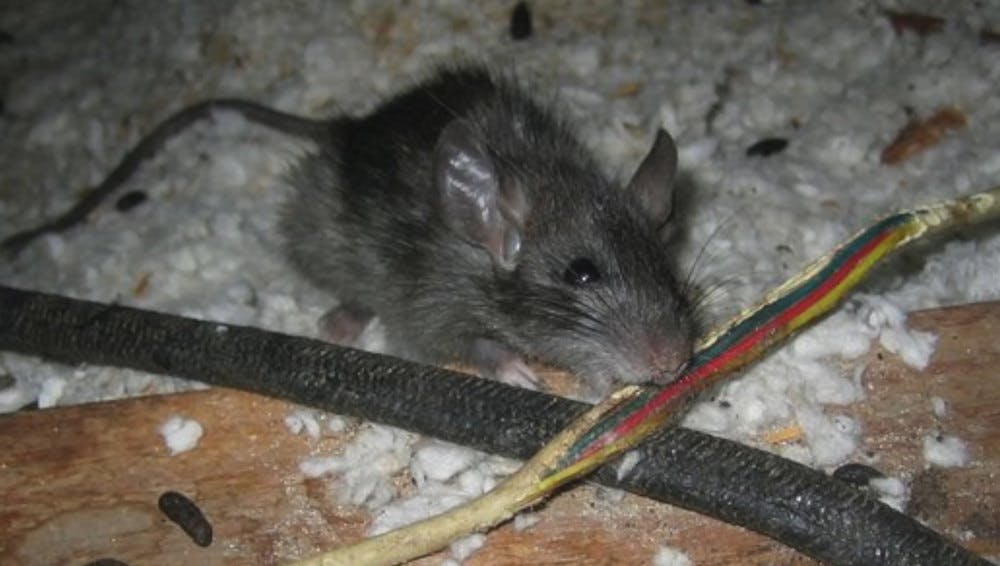Rodents in your attic insulation is a costly problem
How rodents can damage your attic insulation
Rodents can be a nuisance and cause damage to your attic insulation. They nest in the insulation, creating tunnels that compress and reduce its effectiveness. Insulating your attic is important for a comfortable home, especially in colder months. Rodents in your insulation can also be a health risk. Their droppings can spread diseases through the air in your home. Additionally, they can chew on electrical wires, which could create fire hazards. Preventing them entering your attic is crucial. Sealing potential entry points can help. We always recommend hiring pest control to provide the best solution.
What can you do about pests in your attic insulation?
The first step is pest-proofing. Seal any entrances like cracks, gaps, or unscreened vents to make it inhospitable for them. If you notice signs of an infestation, it is important to clean it up. Remove the affected insulation, as it can be both damaged and a health risk. Do not forget to wear protective gear such as gloves, a mask, and clothing that covers your skin.
After cleaning your attic, you need to install new insulation. Try to choose insulation materials that repel pests. Certain types of insulation are treated with borate, making them unappealing to pests.
Always consider hiring professionals for the job. Insulation experts have the right tools and expertise to insulate your attic. They can keep the space safe from future problems. Our pros can offer personalized advice for your home's needs.
How rodents reduce attic insulation energy efficiency
Rodents can reduce energy efficiency of attic insulation. Here are several ways this can happen.
- Destruction of Insulation: Rodents can shred insulation material and puncture holes through them. This compromises the effectiveness of your insulation.
- Heat Loss: Effective attic insulation acts as a barrier to trap heat in your home. But, when rodents tear it apart, the heat escapes more, reducing energy efficiency.
- Air Leakage: When rodents puncture holes in your attic insulation, it will lead to air leakage. Air leakage will reduce insulation effectiveness and increase drafts. As a result, your energy bills will go up.
Hire out Seattle-based contractors to rodent-proof your attic insulation
Best attic insulation to repel rodents:
While there are materials that can keep rodents away, they are not foolproof. You need to keep your attic insulation in good condition to keep rodents at bay. If you have a severe rodent infestation, insulation material will not solve the issue on its own. With that said, here are some good materials to consider.
- Cellulose Insulation: Cellulose Insulation can be treated with boric acid, which can deter rodents. This substance can cause dehydration and disrupt a rodent’s metabolism. As a result, it can discourage them from nesting in the material.
- Spray Foam Insulation: Spray foam leaves no space for rodents to crawl through or nest. It also seals small holes and cracks making it impassable.
- Rockwool Insulation: Also known as mineral wool, this type of insulation is harder and denser than most other types of insulation. It has a fibrous and rough texture, which is not suitable for nests.
- Fiberglass Insulation with Rodent Repellent: Fiberglass insulation can come with a built-in rodent repellent. These repellents are usually non-toxic and safe for use in homes.
- Reflective or Radiant Barrier Insulation: Although this type of insulation is more effective at repelling heat, its slick surface can make movement difficult for rodents.
- Denim Insulation: Made from recycled denim fabric, this type of insulation is treated with a borate solution that gives it fire resistance and also repels rodents.
Identifying rodents in your attic - Common signs
If you notice unusual noises at night in your home, you may have unwanted visitors in your attic. Spotting rodents in your attic can be straightforward if you know what signs to observe. Let's review some common indicators that suggest a rodent issue.
Rodents breed fast, so a small problem can become a big problem if not dealt with quickly. They also attract fleas, mites, ticks, and lice. These pests are attracted to neglected areas so be sure to do regular maintenance in your attic.
- Noise: Scratching, scurrying, or gnawing sounds in your attic, especially at night, is a sign. Since rodents are active at night, these noises suggest their presence. It's important to take action to address the rodent issue as soon as possible.
- Droppings: Tiny, dark droppings is another sign. Take action to prevent insulation damage and health risks. Seek professional help or use appropriate measures to address the rodent problem.
- Nesting materials: Rodents use materials like shredded paper, fabric, or insulation for their nests. Spotting these warrants preventative action.
- Damage: Gnaw marks on food packaging, wires, or insulation is another sign of rodent infestation.
Does attic insulation attract rodents?
While insulation itself isn't a rodent magnet, its warmth and protection make it an appealing nesting spot for these critters. In cooler regions like Seattle, rodents are drawn to your attic insulation. It provides them a temperature-controlled habitat with nesting materials. Rodents are adaptable and can always find a spot in your attic to set up their home base.
To deal with this, be proactive. Conduct regular attic inspections to detect early signs of infestation. Act quickly to address these issues. If it feels overwhelming, seek professional help from our attic insulation experts for effective solutions and preventive advice.
